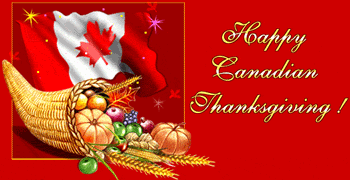Canadian Thanksgiving 2006 .. what does the eclectic identity of this country mean?
Oct 10th, 2006 | By Counterweights Editors | Category: Ottawa Scene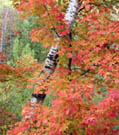 Canadian thanksgiving, up north where the leaves fall from the trees earlier in the colder weather, is not quite the national holiday it is several weeks later in the USA. But this year we have at least had some reminders of just how confusing what Prime Minister Stephen Harper has just called the “unique history and eclectic identity of this country” can be. According to Rafe Mair in BC, e.g., even with Mr. Harper from Alberta in Ottawa Western Canadian alienation is still throbbing. Mr. Harper himself has delivered an unusual message on “Reviving Canadian leadership in the world.” (Which some will say should really be called “Reviving Canadian followership.”) And inside the capital city hothouse there are reports of growing tensions between the new prime minister and the resident representative of the Queen across the sea. Something almost seems to be happening in the eclectic Canadian nation. And maybe by next thanksgiving we’ll know what it is?
Canadian thanksgiving, up north where the leaves fall from the trees earlier in the colder weather, is not quite the national holiday it is several weeks later in the USA. But this year we have at least had some reminders of just how confusing what Prime Minister Stephen Harper has just called the “unique history and eclectic identity of this country” can be. According to Rafe Mair in BC, e.g., even with Mr. Harper from Alberta in Ottawa Western Canadian alienation is still throbbing. Mr. Harper himself has delivered an unusual message on “Reviving Canadian leadership in the world.” (Which some will say should really be called “Reviving Canadian followership.”) And inside the capital city hothouse there are reports of growing tensions between the new prime minister and the resident representative of the Queen across the sea. Something almost seems to be happening in the eclectic Canadian nation. And maybe by next thanksgiving we’ll know what it is?
1. Western alienation now that the west is in …
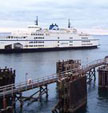 As many among his peers seem to urge, Rafe Mair may not quite reflect the current broad mainstream of popular opinion on Canada’s Pacific Coast. But he sometimes says things that help enlighten those of us back east, who share some parts of his unease with Canada today.
As many among his peers seem to urge, Rafe Mair may not quite reflect the current broad mainstream of popular opinion on Canada’s Pacific Coast. But he sometimes says things that help enlighten those of us back east, who share some parts of his unease with Canada today.
Yet most Ontario residents actually paying attention to Mr. Mair’s October 6 column on the Opinion 250 website, e.g., are probably going to find it sad as well as annoying to hear how “readers in Central and Eastern Canada ought to know that British Columbia and Alberta are as unalike as chalk and cheese but with this in common – they’re tired of Canada.”
Some in Canada’s most populous province still deal with the challenge to their stubborn complacency in such remarks by just ignoring them. But this only inflames what a comment-writer on Mr. Mair’s October 6 column calls the “whiners,” and makes them whine louder. And this never has been a very interesting Canadian game.
 On the hypothesis that the country everyone’s tired of now has at last reached a point where some more constructive response makes more sense, there are those in Ontario today who will want to tell Mr. Mair he ought to know that growing numbers of diverse Central Canadians are almost as fed up with almost the same things he’s fed up with too.
On the hypothesis that the country everyone’s tired of now has at last reached a point where some more constructive response makes more sense, there are those in Ontario today who will want to tell Mr. Mair he ought to know that growing numbers of diverse Central Canadians are almost as fed up with almost the same things he’s fed up with too.
They agree when Rafe Mair says that “the O Canada! we sing is for a very much different Canada than presently exists.”And they do not really “see Canada as two founding nations'” either. These days especially, just on trips to the grocery store, they can see for themselves that the real story is a lot more complicated. (Granting that Canada today does have two official languages. Whatever that may exactly mean. And even some degree of constitutional recognition of aboriginal rights.)
No doubt, most even in the darkest Toronto financial district of 2006 would almost certainly disagree with Rafe Mair when he says that “Canada … has always been run by Central Canadians for the principal benefit of Central Canada.” (If only that were true, many will sigh. And if it were, it would not be so necessary for Premier Dalton McGuinty to struggle on valiantly with his current “Strong Ontario” campaign – “Seeking Fairness for Canadians Living in Ontario.”)
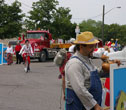 At the same time again, increasing numbers of Canadians living in Ontario these days would gladly second Mr. Mair’s abrupt contempt for a federal “system where less than 40% of voters thus only 25% of eligible voters get 100% of the power.” No one who has authentic concerns about what is happening to democracy in Canada today can continue to be complacent about this kind of increasingly appalling statistic.
At the same time again, increasing numbers of Canadians living in Ontario these days would gladly second Mr. Mair’s abrupt contempt for a federal “system where less than 40% of voters thus only 25% of eligible voters get 100% of the power.” No one who has authentic concerns about what is happening to democracy in Canada today can continue to be complacent about this kind of increasingly appalling statistic.
(And this has been especially clear in Ontario ever since the aggressive Harper Conservative minority government came into office in Ottawa this past February – with only 36.3% of the cross-Canada popular vote, but 65.0% of the vote in Alberta. And 37.3% in BC too, though, mind you, the Harper Conservatives also took 35.1% of the vote in Ontario – which in this case at least does make BC look more like Ontario than it looks like Alberta out west next door.)
What some high-minded aspiring Canadians in Ontario will finally still just dismiss as annoying is Rafe Mair’s continuing tired stress on how “tired of Canada” so many parts of the country have become. In the Toronto that is also the province’s capital city, the cynical practical political response to all this right now is just that Ontario is tired of Canada too. Thus (again) Premier McGuinty’s current “Strong Ontario” campaign.
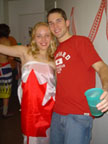 But even many less cynical Central Canadians still paying attention will still want to say enough being tired of Canada is enough. How can we support the troops if we don’t even support the country, etc? Yes there need to be big changes in Canada. So let’s just get on with trying to make them happen in the real world, etc.
But even many less cynical Central Canadians still paying attention will still want to say enough being tired of Canada is enough. How can we support the troops if we don’t even support the country, etc? Yes there need to be big changes in Canada. So let’s just get on with trying to make them happen in the real world, etc.
Another comment-writer on Rafe Mair’s October 6 column says: “A start would be an elected head of state via one vote per citizen of Canada. Next regional representation needs to be protected via an effective Senate.” Believe it or not, there are growing numbers in Ontario today who are ready to get started on such reforms. And Mr. Mair should stop telling us how tired he is of Canada, and start saying instead what he thinks the very next practical changes in current Canadian institutions should be.
 “It is not just Quebec we should worry about,” as Mr. Mair does say himself. But it is not just Alberta and BC either. All Canadians now do seem almost distressingly close to some point where we should all start worrying about everywhere (and everyone), or we soon won’t have anywhere left to worry about. Except of course for the United States.
“It is not just Quebec we should worry about,” as Mr. Mair does say himself. But it is not just Alberta and BC either. All Canadians now do seem almost distressingly close to some point where we should all start worrying about everywhere (and everyone), or we soon won’t have anywhere left to worry about. Except of course for the United States.
(Meanwhile, for the time being, Premier McGuinty will just soldier on with the Strong Ontario campaign – and see how well that plays in the next provincial election. But it seems as close as you can get in politics to a certainty that he never reads Rafe Mair’s columns. And don’t expect him to be any more sensible than Ralph Klein.)
2. Mr. Harper’s Plan for “Reviving Canadian leadership in the world”
 Another reading of Rafe Mair’s October 6 Canadian thanksgiving column implies some disaffection in the western populist branch of Prime Minister Harper’s political base – only eight months into his new government’s still quite uncertain term in office.
Another reading of Rafe Mair’s October 6 Canadian thanksgiving column implies some disaffection in the western populist branch of Prime Minister Harper’s political base – only eight months into his new government’s still quite uncertain term in office.
As yet another comment-writer put it: “I agree with Rafe. Stephen Harper is quickly forgetting where his reform party started. He is making more deals with the Bloc to stay in power. It is a precarious position he is putting himself in, much like Mulroney in the past.”
It may also be that many western populists in Mr. Harper’s new Conservative coalition will not think all that highly of his latest visionary high-policy remarks, on October 5, at a Calgary event where he received the “Woodrow Wilson Award for Public Service.” (There are signs of bigger wheels moving within wheels here too, of course, but set that aside for now.)
 There is as well very little in these remarks to engage the traditional nation-building sympathies of Canada’s most populous province in Ontario. (The big economic news, e.g., is that “Canada is, as I have said, an emerging energy superpower … It is one reason why Canada will increasingly be a leader and why Alberta is a leader within it.”) Prime Minister Harper probably is a more exotic and uniquely Canadian bird than he has yet been given credit for. But at least in much of old Ontariario the question remains: can this bird really fly?
There is as well very little in these remarks to engage the traditional nation-building sympathies of Canada’s most populous province in Ontario. (The big economic news, e.g., is that “Canada is, as I have said, an emerging energy superpower … It is one reason why Canada will increasingly be a leader and why Alberta is a leader within it.”) Prime Minister Harper probably is a more exotic and uniquely Canadian bird than he has yet been given credit for. But at least in much of old Ontariario the question remains: can this bird really fly?
The good news is that Stephen Harper is capable of saying at least a few interesting and impressive things about the Canadian national future. And he is a real home-cooked policy wonk, with some neatly conceived and sometimes even felicitously expressed ideas about the new Canada he thinks he is trying to help set in motion.
Who anywhere, e.g., would want to disagree with any of:
* “We want to ensure that we can preserve our identity and our sovereignty”;
* “The globe is becoming a village. And virtually every significant challenge we face – economic, environmental, demographic, security, health, energy, you name it – contains an important, if not critical, international dimension”;
* Canadians “want a Canada … that punches above its weight” in this global village … “capable of … projecting our values of freedom, democracy, human rights and the rule of law”;
* “I also wanted to underline our government’s commitment to … asserting Canadian sovereignty … over all of our territory, including the islands and waterways of our Arctic”; and
* “we … stress our support for the UN Convention on Cultural Diversity, a document that reflects the unique history and eclectic identity of this country.”
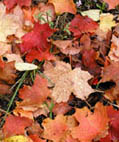 Yet many in Ontario, and elsewhere in the country too, no doubt, will still find that the central thrust of Prime Minister Harper’s October 5 remarks in Calgary finally strays into a kind of fantasy land. (And it actually may not be too big an exaggeration to say that this is Mr. Harper’s uniquely Canadian version of the fantasy land into which George W. Bush has been struggling to lead the USA today since September 11, 2001.)
Yet many in Ontario, and elsewhere in the country too, no doubt, will still find that the central thrust of Prime Minister Harper’s October 5 remarks in Calgary finally strays into a kind of fantasy land. (And it actually may not be too big an exaggeration to say that this is Mr. Harper’s uniquely Canadian version of the fantasy land into which George W. Bush has been struggling to lead the USA today since September 11, 2001.)
Just very quickly, e.g., the remarks are entitled “Reviving Canadian leadership in the world.” But just what can “Reviving” seriously mean here? When was Canada ever a leader in the world before?
Under Pierre Trudeau, on his best days and in some senses, sort of, some might say? Yet except perhaps in some very vague and general respects, Trudeau’s own kind of rather fantastic stabs at “middle power” international leadership are not really what Stephen Harper has in mind.
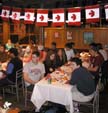 Or, as Prime Minister Harper explains himself: “While not among the ranks of world powers, we have long been a significant part of important and influential world bodies … Our membership in the Commonwealth preserves the ties of the worldwide British Empire of which we were long a proud part … Our position in the Francophonie reflects our cultural and historical ties to France, which remains a country of influence with global visibility … We belong to the world’s most important military alliance, NATO … This summer Laureen and I visited Vimy Ridge in northwest France, the scene of some of the most terrible fighting in the First World War. It’s the last resting place for her great uncle, James Teskey, and literally thousands of young men like him … Most died in a few short days, in a battle where Canadians, considered backwater colonials, led the successful final assault.”
Or, as Prime Minister Harper explains himself: “While not among the ranks of world powers, we have long been a significant part of important and influential world bodies … Our membership in the Commonwealth preserves the ties of the worldwide British Empire of which we were long a proud part … Our position in the Francophonie reflects our cultural and historical ties to France, which remains a country of influence with global visibility … We belong to the world’s most important military alliance, NATO … This summer Laureen and I visited Vimy Ridge in northwest France, the scene of some of the most terrible fighting in the First World War. It’s the last resting place for her great uncle, James Teskey, and literally thousands of young men like him … Most died in a few short days, in a battle where Canadians, considered backwater colonials, led the successful final assault.”
It is time, Mr. Harper ultimately seems to be saying, for the backwater colonials to rise again. And, some will complain, that really means reviving the old colonial tradition of Canadian followership in the world, not leadership. In the early 21st century some of the names have been changed to protect the innocent. But the melody lingers on – and monotonously on and on and on.
Where is the real bolder and more dynamic new Canada in all this? Isn’t Prime Minister Harper just trying to go back to the way things were in the first half of the 20th century? And, like what still strikes many as his overwrought enthusiasm for the Canadian mission in Afghanistan today (on which high-flying note he ended his October 5 remarks) – or like George W. Bush’s current unhappy quest in Iraq – the biggest question here is still whether any revival of these good old days can finally prove workable in the quite different new global village we live in now?
3. The Monarchy and the Imperial Prime Ministership …
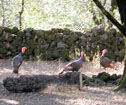 On a very quick related and final thanksgiving theme, some further intriguing aspects of Prime Minister Harper’s new Canadian vision also surfaced in October 5 and 7 reports in the Toronto Star – on the emerging Ottawa hothouse conflict, between Stephen Harper’s new Canada and (as much of the current established urban Ontario sees it, at least) the excellent Governor General Michaelle Jean.
On a very quick related and final thanksgiving theme, some further intriguing aspects of Prime Minister Harper’s new Canadian vision also surfaced in October 5 and 7 reports in the Toronto Star – on the emerging Ottawa hothouse conflict, between Stephen Harper’s new Canada and (as much of the current established urban Ontario sees it, at least) the excellent Governor General Michaelle Jean.
To get straight to the point here, go back to the comment-writer on Rafe Mair’s October 6 column who says: “A start” on properly reforming current Canadian institutions “would be an elected head of state via one vote per citizen of Canada. Next regional representation needs to be protected via an effective Senate.”
It would seem that Mr. Harper’s new Canada – in the grand old Central Canadian tradition of recurrent abject compromise – wants to split the difference on this kind of proposition. It can be so easy to forget that though Stephen Harper now lives in Calgary, when he isn’t in Ottawa, he was born and raised in a somewhat stodgy suburb of an earlier Toronto.
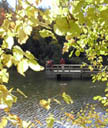 Mr. Harper, that is to say, is nicely resolute, as he does explain in his October 5 remarks, that “the next stage of our accountability agenda must include fundamental change to that badly out-dated institution, the Senate of Canada.”
Mr. Harper, that is to say, is nicely resolute, as he does explain in his October 5 remarks, that “the next stage of our accountability agenda must include fundamental change to that badly out-dated institution, the Senate of Canada.”
But if you count yourself among any of those old western, central, and eastern Canadian populists and others anywhere who do really want “an elected head of state via one vote per citizen of Canada” (a.k.a. abolish the old colonial British monarchy and become a proper democratic republic at last), then it now does seem to have become clear enough that Stephen Harper is not going to be your man.
Stephen Harper’s new Canada, that is to say, is still going to be finally leaning on the authority of the old British monarchy in Canada – and not altogether on that of the present-day sovereign Canadian people. This is still the old as well as the new Conservative Party of Canada, etc, etc., that once upon a time brought you the Upper Canadian Family Compact, and all that.
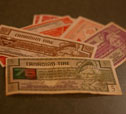 So why, you might ask, is Prime Minister Harper not getting along so well (or at all apparently) with the Queen’s representative in Canada, Governor General Jean? There seem to be two quite logical quick answers to this question.
So why, you might ask, is Prime Minister Harper not getting along so well (or at all apparently) with the Queen’s representative in Canada, Governor General Jean? There seem to be two quite logical quick answers to this question.
The first is just that for Mr. Harper the old colonial monarchy in the new Canada is most important because it finally just props up the quite vast executive authority of the modern elected prime minister of Canada – which Mr. Harper himself seems quite keen to use as aggressively as he can manage, with or without a majority in Parliament.
The monarchy today, on its best face in this theory, is finally what lets the prime minister get things done, amidst the all too complicated “unique history and eclectic identity of this country.” On one of its various less friendly faces, it is also the uniquely Canadian prop for the Imperial Prime Ministership, which emulates the aspiring Imperial Presidency in the USA, and all that.
 In any case, under Mr. Harper’s theory the job of the governor general is just to sign all the legislation, cut all the politically inconsequential ribbons, and leave everything else to the prime minister, whose advice is to be followed so exactly as to never require any actual human communication.
In any case, under Mr. Harper’s theory the job of the governor general is just to sign all the legislation, cut all the politically inconsequential ribbons, and leave everything else to the prime minister, whose advice is to be followed so exactly as to never require any actual human communication.
The trouble with Mme Jean is that, like Mme Clarkson before her, she is trying to make more of the office – in keeping with various other challenges of the new Canada today. Mr. Harper’s main point (or at least that of his staff who are doing the talking) seems to be that Governor General Jean is improperly blurring the official policy message from Ottawa.
Or she is interfering in politics, rather broadly conceived, in a way that goes beyond the proper behaviour of the monarch or her representative in the Canadian branch of the British constitutional monarchy today. (And see the October 5 and October 7 reports in the Toronto Star for all the gory if inevitably somewhat trivial details.)
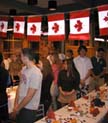 On the other hand, you could say as well that Mme Jean, again like Mme Clarkson before her, is starting to behave more as any conceivable “elected head of state via one vote per citizen of Canada” might be expected to behave. But the trouble here of course is that she was not in fact elected by anyone, to say nothing of via one vote per citizen of Canada. She was appointed by the former Liberal prime minister, Paul Martin, for a term that only ends in September 2010.
On the other hand, you could say as well that Mme Jean, again like Mme Clarkson before her, is starting to behave more as any conceivable “elected head of state via one vote per citizen of Canada” might be expected to behave. But the trouble here of course is that she was not in fact elected by anyone, to say nothing of via one vote per citizen of Canada. She was appointed by the former Liberal prime minister, Paul Martin, for a term that only ends in September 2010.
This is also of course the second quite logical quick answer to the question of why Prime Minister Harper is not getting along so well (or at all apparently) with Governor General Jean. How can a Conservative leader possibly trust a Liberal-appointed governor general – at a time when the governor general’s unique reserve power to decide on the outcome of unclear parliamentary elections just might come into play soon enough? (Because of course it would no longer be at all acceptable to have the actual Queen of England get involved in such strictly Canadian matters. Canada today is not a colony any longer, after all, etc.)
But the discussion here is already far too long. And all this complicated and fascinating business will have to be left for another day. For the moment, it is enough just to wonder whether, here as in some other places, Prime Minister Harper is finally trying to lead his new Canada that is still an old British constitutional monarchy into yet another kind of fantasy land, that can nowadays not really work in the end?
